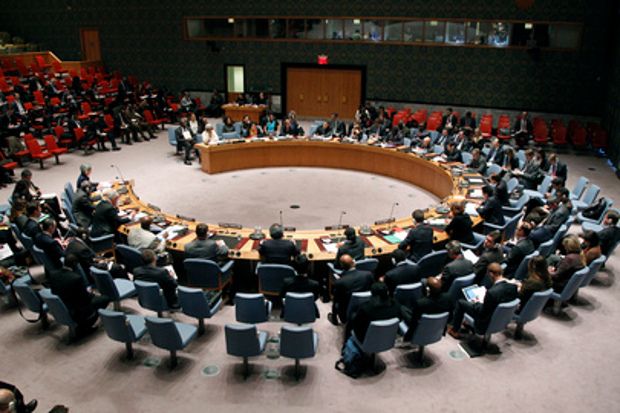
"For the first time, we have an absolutely unique, unimaginable situation...that a permanent member of the UN Security Council is an aggressor in Ukraine, waging a hybrid war against Ukraine," said Ukrainian Foreign Minister Pavlo Klimkin who traveled in New York to campaign for his country's election, RFE/RL reported on Thursday.
He added that Ukraine has a broader global agenda, but its tone with Russia will "definitely not be conciliatory."
Klimkin said Ukraine foresees strengthening the United Nations by gradually limiting and eventually abolishing the right to veto on the council, which is currently held not only by Russia but by Britain, China, France, and the United States.
France supports the proposal, but the United States and other world powers do not.
"Abuse of the veto right -- its usage as a 'license to kill' -- is unacceptable," Ukrainian President Petro Poroshenko told the UN in September.
Russia has vetoed two resolutions on Ukraine -- one affirming Crimea as part of Ukraine and one aiming to set up an international criminal tribunal to prosecute those responsible for the downing of Malaysia Airlines flight MH17 over eastern Ukraine.
UN member states are to select five nonpermanent members to sit on the Security Council in 2016 and 2017. Candidates need to get approval from two-thirds of the UN's 193 member countries to win a seat.
Read alsoExclusive interview with Ukraine's UN Ambassador: "Security Council needs to change its very philosophy" Currently, five countries have announced their candidacies for five positions that are becoming vacant at the end of the year: Egypt and Senegal from the African regional group, Japan to represent Asia-Pacific, Uruguay from Latin America, and Ukraine to represent Eastern Europe.
While all countries are running seemingly unopposed, the requirement for a two-thirds majority makes the outcome of the elections somewhat uncertain.
The newcomers will begin their two-year stint on January 1, replacing Chad, Chile, Jordan, Lithuania, and Nigeria.

